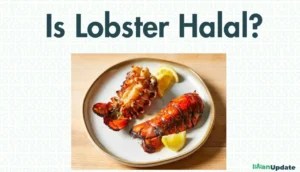Is Octopus Halal in Islam? Exploring the Islamic Perspective

Seafood is a staple in many cultures around the world, but for Muslims, the halal status of various sea creatures is a crucial consideration. Among these creatures is the octopus—a fascinating animal that has intrigued both scientists and food enthusiasts alike.
But when it comes to Islamic dietary laws, many wonder: is octopus halal or haram? In this post, we’ll explore the diverse Islamic rulings on octopus consumption, shedding light on why some scholars permit it while others discourage or prohibit it.
Is Octopus Halal?
The halal status of octopus is a topic that varies across different schools of Islamic thought. While most Sunni scholars consider octopus to be halal, there are differing opinions within other branches of Islam. These differences arise due to varying interpretations of the Quran, Hadith, and traditional teachings.
By examining these views, we can gain a more nuanced understanding of why octopus is seen as permissible or prohibited in different contexts.
Octopus in Sunni Islam
Within Sunni Islam, most scholars from the Shafi’i, Hanbali, and Maliki schools of law agree that octopus, along with other forms of “sea game,” is permissible to consume.
The reasoning behind this permissibility is grounded in Islamic scripture, particularly the Quran and the sayings of the Prophet Muhammad (peace and blessings be upon him).
The broad wording of the Quranic verse in Surah Al-Ma’idah (5:96) — “The game of the sea and its food are lawful unto you” — is often cited as evidence that all sea creatures are halal unless they pose a danger or are harmful to health.
This verse provides a general ruling, which scholars apply broadly to all creatures that live in water.
For example, even though octopuses do not have scales, they are still considered lawful because there is no specific prohibition against them in the Quran or Hadith.
This open-ended permission makes it easier for Muslims to enjoy the bounty of the sea without excessive restrictions.
Hadith Evidence: Additionally, a well-known hadith recorded by Abu Dawud further supports the permissibility of sea creatures.
The Prophet Muhammad (peace be upon him) was asked about the sea, and he replied, “Its water is pure and its dead (animals) are lawful.” This hadith reinforces the idea that seafood, whether alive or dead, can be consumed without needing to adhere to the usual slaughtering requirements.
READ ALSO: Is Shellfish Halal? A Complete Guide
Why Is Octopus Considered Halal by Most Scholars?
For Sunni Muslims, octopus is considered halal based on the general permissibility of seafood. The Quran and Hadith repeatedly emphasize the lawfulness of sea creatures, including those that do not fall into the traditional categories of fish.
This ruling makes octopus permissible by default unless there is clear evidence that it is harmful or dangerous to consume.
Moreover, Islamic dietary laws are designed to be practical and accessible for the global Muslim community.
The permissibility of octopus aligns with the broader principle of ease in Islamic jurisprudence, where Muslims are encouraged to make use of the resources available to them, provided they do not contradict Islamic principles.
Octopus in the Hanafi School
The Hanafi school of Sunni jurisprudence, which is followed by many Muslims in South Asia, offers a more restrictive view on seafood consumption.
Unlike the other Sunni schools, Hanafis limit the types of permissible sea creatures to “fish,” which they define narrowly. According to this interpretation, only creatures that have the external characteristics of fish are fully halal.
Since octopus does not meet this criterion, it is classified as makrooh (disliked but not sinful to eat).
The Hanafi view is rooted in a cautious approach to dietary laws. By restricting permissible seafood to fish, they aim to ensure that Muslims consume only what is clearly allowed.
For Hanafi followers, this means avoiding creatures like octopus, squid, and other sea animals that do not resemble fish.
Octopus in Shia Islam
In contrast to Sunni interpretations, the Shia school of thought imposes stricter rules on seafood consumption. According to Shia scholars, only fish with scales are permissible, and any other sea creatures are considered haram.
This prohibition extends to octopus, squid, and crustaceans. The Shia position is derived from specific Quranic verses and hadiths, which they interpret as limiting permissible seafood to fish with scales.
For Shia Muslims, this ruling is clear-cut: octopus is haram, and its consumption should be avoided.
This view reflects a broader interpretation of Islamic dietary laws within the Shia tradition, where restrictions on certain types of food are more pronounced.
The Wisdom Behind Islamic Dietary Laws
Islamic dietary laws are not arbitrary; they are deeply rooted in both spiritual and practical wisdom. The permissibility of seafood, including octopus, reflects the understanding that the ocean is a vast resource provided by Allah for human benefit.
As mentioned in Surah An-Nahl (16:14), “It is He Who has made the sea subject, that you may eat thereof flesh that is fresh and tender.” This verse highlights the blessings of the sea and encourages Muslims to make use of its provisions, provided they do not consume anything harmful or dangerous.
By allowing most sea creatures to be consumed, Islamic law aims to make life easier for believers, particularly in regions where seafood is a primary food source.
However, the restrictions imposed by different schools of thought also emphasize the importance of careful consideration and adherence to Islamic principles.
Scholarly Opinions on Octopus Consumption
Many scholars have weighed in on the permissibility of eating octopus. Sheikh Ahmad Kutty, a prominent Islamic scholar, supports the view that all varieties of fish and sea creatures are lawful to eat.
He cites the Quranic verse from Surah Al-Ma’idah (5:96) as clear evidence that seafood is halal unless explicitly forbidden.
Similarly, Shaikh Assim Al Hakeem, a well-known Islamic scholar, emphasizes that unless a specific food is mentioned in the Quran as haram, it should generally be considered halal.
These opinions reinforce the idea that octopus, as a sea creature, is permissible for Muslims to consume, provided it is not harmful or poisonous.
The scholarly consensus among Sunni Muslims points to a broad acceptance of seafood, with only a few exceptions.
Is Octopus Haram?
For the vast majority of Muslims, octopus is not considered haram. Sunni scholars, particularly from the Shafi’i, Hanbali, and Maliki schools, generally agree that it is permissible to eat octopus, along with other sea creatures.
However, for Hanafi Muslims, it is makrooh, meaning it is better to avoid but not sinful if consumed. In Shia Islam, octopus is strictly haram due to the lack of scales.
Can Muslims Eat Octopus?
Yes, Muslims from most Sunni schools of thought can eat octopus without any hesitation. It is considered halal and permissible.
However, followers of the Hanafi school may choose to avoid it due to its classification as makrooh, while Shia Muslims refrain from eating it altogether as it is deemed haram.
Conclusion
In summary, the halal status of octopus varies depending on the Islamic school of thought. While most Sunni scholars permit the consumption of octopus as halal, the Hanafi school discourages it by classifying it as makrooh, and Shia scholars consider it haram.
For those who follow the Sunni interpretation, octopus is a lawful sea creature that can be enjoyed without concern, provided it is not harmful or dangerous.
As always, it is recommended to consult with local scholars or follow the rulings of your particular school of thought for guidance on dietary matters.
Ultimately, the wisdom of Islamic dietary laws reflects Allah’s mercy and understanding of human needs, allowing Muslims to enjoy the provisions of the sea in a manner that is easy and beneficial.






